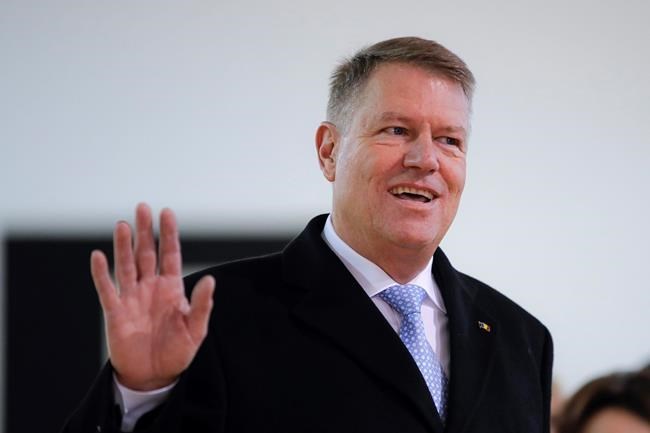
Romanian President Klaus Iohannis waves after casting his vote in Bucharest, Romania, Sunday, Nov. 24, 2019. Romanians are voting in a presidential runoff election in which incumbent Klaus Iohannis is vying for a second term, facing Social Democratic Party leader Viorica Dancila, a former prime minister, in Sunday's vote. (AP Photo/Vadim Ghirda)
Republished November 24, 2019 - 2:04 PM
Original Publication Date November 24, 2019 - 12:36 AM
BUCHAREST, Romania - Klaus Iohannis was re-elected Romania’s president Sunday, easily winning a runoff vote amid vows to continue fighting corruption and strengthen the rule of law.
With 88% of the votes counted, the centre-right Iohannis had 63.2% while Social Democratic Party leader Viorica Dancila, a recently ousted former prime minister, had 36.8%.
“Romania won! Modern, European, normal Romania won today,” Iohannis said at the headquarters of the National Liberal Party after the release of an exit poll forecasting his victory. “Romanians were the day’s heroes. They went to vote in impressive numbers and this is the most important gain of this day.”
“I receive this victory with joy, thankfulness, modesty and with faith in Romania,” said the 60-year-old former mayor of the city of Sibiu, a member of Romania’s ethnic German minority who was a high school physics teacher before entering politics.
Voter turnout for the runoff was 49.87%, down from 53.17% in 2014.
For her part, speaking after casting her ballot in the morning, Dancila had promised “more involvement, work and commitment to the Romanian people.”
Dancila’s government was ousted Oct. 10 after losing a confidence vote in parliament. It had been embroiled by allegations of corruption and criticized by the European Union for judicial reforms seen as compromising the rule of law and the independence of judges.
Earlier this month, lawmakers backed a minority government led by Prime Minister Ludovic Orban of the National Liberal Party, formerly headed by Iohannis.
Iohannis clashed often with Dancila and her party over the judiciary reforms and other legislation. Opponents and critics worried about the dilution of anti-corruption laws which in the past few years led to the indictment of dozens of Cabinet members, lawmakers and even a Romanian member of the European Parliament.
Public outrage also resulted in frequent, mass anti-corruption protests in Bucharest and other cities.
With their shared ideological roots and values, Iohannis and Orban are expected to work together to boost the anti-graft measures.
Though lacking an executive role, Romania's president has significant decision-making powers, including on matters of national security and foreign policy. Elected for a five-year term, the president can also reject party nominees for prime minister and government nominees for judicial appointments.
Romania, a member of the EU since 2007, is plagued by widespread poverty with over 25% of its population living on less than $5.50 a day, according to a World Bank study last year. Recent figures pointed to slowing economic growth, though the annual rate of 3% per cent achieved in the third quarter of the year was still among the fastest in Europe.
Romanians living abroad, estimated to number around 4 million, started casting their votes on Friday at hundreds of polling stations, including in Italy, Britain, France, Australia and the U.S. Romanians abroad also have the option of mailing in their ballots.
News from © The Associated Press, 2019